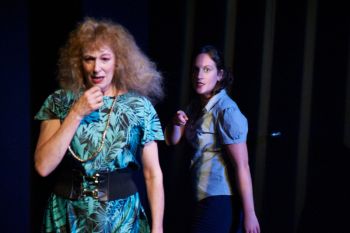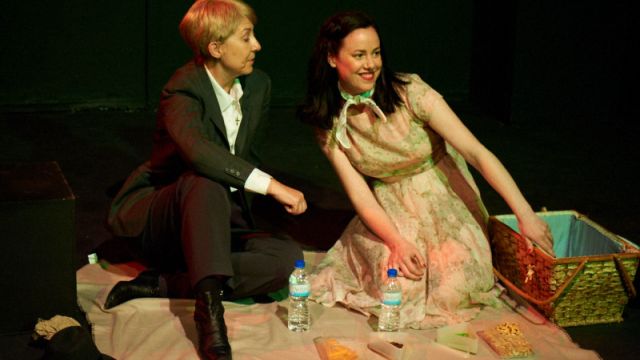Into the Mirror
It is Damshel Productions' aim to “produce theatre that addresses social issues and the complexities of the human condition”. This play certainly does that. Without being at all confronting, it uses theatre to raise awareness of the complexities of gender transition – for the individuals and for those they love.
Other plays and movies have dealt with gender issues and relationships, the majority of them about gay men. All of them avoid the actual issue of gender transition. Not so with Into the Mirror! It tackles all the complications that evolve when people are brave and strong enough to accept who they are – and do something about it – then have to deal with the effect on family and friends and in the work place.
Doing this on the stage, in a relatively short play, is also brave. Shelley Wall tells a story well. She understands the issues. She does her research carefully. She creates strong characters with whom the audience – gay or straight – can empathise. In some scenes the dialogue is so natural and poignant, and gentle, that Wall’s messages should resonate with the broader, less sympathetic, audience that she hopes to reach.
 It must be said, however, that the characters and their issues and relationships are rather complicated. It’s understandable that Wall wants to ‘say it all’ and she certainly does. For a gay and lesbian audience, it’s all out there on the stage to be celebrated – self awareness and acceptance, rejection by family, hiding from family, gay rights, gay marriage, even rape. For a straight audience it should also be a celebration, and theatre is the age-old way to do it, though regular theatre-goers might find the plot just a little too contrived!
It must be said, however, that the characters and their issues and relationships are rather complicated. It’s understandable that Wall wants to ‘say it all’ and she certainly does. For a gay and lesbian audience, it’s all out there on the stage to be celebrated – self awareness and acceptance, rejection by family, hiding from family, gay rights, gay marriage, even rape. For a straight audience it should also be a celebration, and theatre is the age-old way to do it, though regular theatre-goers might find the plot just a little too contrived!
Wall’s courage in bringing the issues to the stage is matched by her cast. Penny Day plays Kendall – whose transition from Sally disturbs his pop singer daughter Melanie (Amber Robinson). Returning from England unexpectedly to announce her impending marriage, Melanie wants a mother, not two fathers! Day’s portrayal of Kendall finds the inner turmoil the character has faced, and the subsequent strength needed to make the momentous decision to change. Robinson’s Melanie is confused and angry, and though sometimes just a little too ‘teenage’, finds some nice moments, especially with Aunt Sophia. This character, played by Carole Sharkey-Waters, is just a little over-the-top but certainly endearing.
 Helen Stuart is charismatic as Tyler. Her portrayal of this character’s confusion is very natural and engaging, as is that of Katie Lees, when she plays Laura, Tyler’s partner. She is less believable in the two other, smaller parts she plays, but as Laura she is strong and confident.
Helen Stuart is charismatic as Tyler. Her portrayal of this character’s confusion is very natural and engaging, as is that of Katie Lees, when she plays Laura, Tyler’s partner. She is less believable in the two other, smaller parts she plays, but as Laura she is strong and confident.
It will be interesting to see, when this play is taken up by practitioners other than its playwright, what directorial visions arise. Here the scenes move from one side of the stage to the other. Pieces of furniture are carried on and off when they could simply be left at the side of the stage. Actors sometimes move out of light. Sometimes the ends of sentences are lost or lines delivered too softly to reach all of the audience. Perhaps this will change as the run proceeds. Music has been composed for the play – but isn’t used to its full extent – for example to compliment scene changes.
Nevertheless, Shelley Wall has achieved her aim to find “a way to blend the issues, themes and political statements into real situations for the story to resonate with honesty”.
Carol Wimmer
Photographer: Pat Carter.
Subscribe to our E-Newsletter, buy our latest print edition or find a Performing Arts book at Book Nook.

